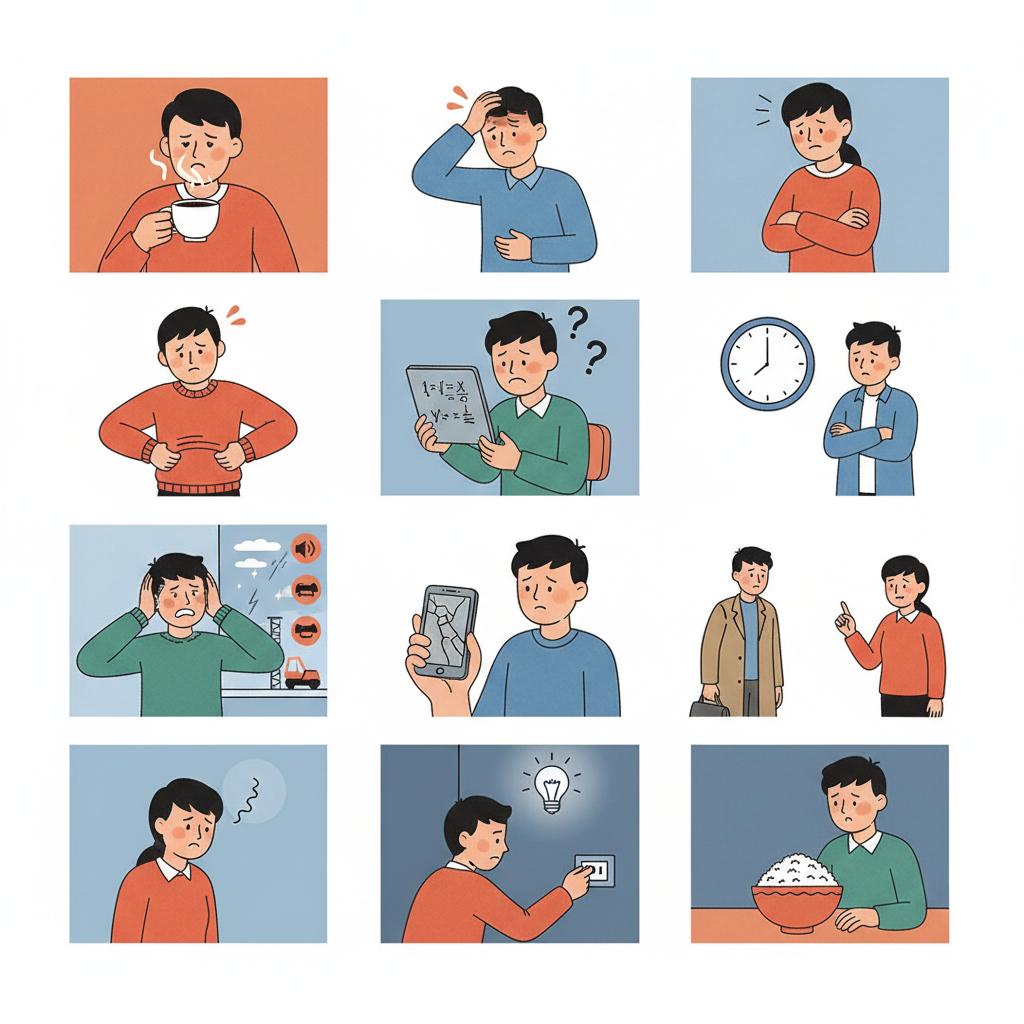😬 Degree Adverb 有点儿 (yǒudiǎnr) - A Bit Too Much

🇪🇸 ESPAÑOL
¡Hola! Como tu profesora de chino, hoy vamos a ver una estructura muy útil y común: el uso de "有点儿" (yǒudiǎnr). ¡Vamos a ello!
El adverbio de grado "有点儿" (yǒudiǎnr) se coloca delante de un adjetivo o de ciertos verbos que expresan estados o sentimientos. Su función principal es indicar una connotación negativa o una queja sutil por parte del hablante. No significa simplemente "un poco", sino más bien "un poco demasiado", expresando que algo excede ligeramente el grado deseado o aceptable. Por ejemplo, al decir que algo está "有点儿贵" (yǒudiǎnr guì), no solo informas de que es "un poco caro", sino que insinúas que su precio te parece excesivo o que no estás muy contento con él.
🇬🇧 ENGLISH
Hello! As your Chinese teacher, today we are going to see a very useful and common structure: the use of "有点儿" (yǒudiǎnr). Let's get to it!
The degree adverb "有点儿" (yǒudiǎnr) is placed before an adjective or certain verbs that express states or feelings. Its main function is to indicate a negative connotation or a subtle complaint by the speaker. It doesn't simply mean "a bit", but rather "a bit too much", expressing that something slightly exceeds the desired or acceptable degree. For example, when saying something is "有点儿贵" (yǒudiǎnr guì), you're not just saying it's "a bit expensive", but you're also implying that its price seems excessive to you or that you're not very happy with it.
📚 Key Phrase: 这杯咖啡有点儿苦。 (Zhè bēi kāfēi yǒudiǎnr kǔ.)
Grammar Focus
📝 Grammar Structure | Estructura Gramatical
🇪🇸 ESPAÑOL
Estructura básica:
有点儿 + Adjetivo/Verbo de estado
Ejemplo: 有点儿贵 (yǒudiǎnr guì) = "un poco (demasiado) caro"
Función y tono:
- Connotación NEGATIVA: indica insatisfacción sutil
- Expresa que algo excede lo aceptable
- Es una queja indirecta y educada
- NO se usa con adjetivos positivos (❌ 有点儿好)
Diferencia con 一点儿:
• 有点儿 = antes del adjetivo (tono negativo)
• 一点儿 = después del adjetivo (cantidad pequeña, neutro)
• Ejemplo: 有点儿贵 (queja) vs. 贵一点儿 (comparación neutra)
Adjetivos/Estados comunes con 有点儿:
- Negativos: 贵 (caro), 难 (difícil), 吵 (ruidoso), 旧 (viejo)
- Estados: 累 (cansado), 生气 (enfadado), 不舒服 (mal)
- Tiempo: 晚 (tarde), 早 (temprano - si es inconveniente)
⚠️ Importante: 有点儿 SIEMPRE tiene matiz negativo o de queja, nunca positivo.
🇬🇧 ENGLISH
Basic structure:
有点儿 + Adjective/State verb
Example: 有点儿贵 (yǒudiǎnr guì) = "a bit (too) expensive"
Function and tone:
- NEGATIVE connotation: indicates subtle dissatisfaction
- Expresses that something exceeds what's acceptable
- It's an indirect and polite complaint
- NOT used with positive adjectives (❌ 有点儿好)
Difference with 一点儿:
• 有点儿 = before adjective (negative tone)
• 一点儿 = after adjective (small amount, neutral)
• Example: 有点儿贵 (complaint) vs. 贵一点儿 (neutral comparison)
Common adjectives/states with 有点儿:
- Negative: 贵 (expensive), 难 (difficult), 吵 (noisy), 旧 (old)
- States: 累 (tired), 生气 (angry), 不舒服 (unwell)
- Time: 晚 (late), 早 (early - if inconvenient)
⚠️ Important: 有点儿 ALWAYS has a negative or complaint nuance, never positive.
💡 Key Points | Puntos Clave
🇪🇸 ESPAÑOL
- 有点儿 = "un poco (demasiado)" (queja sutil)
- Connotación SIEMPRE negativa
- Va ANTES del adjetivo/verbo de estado
- Nunca con adjetivos positivos
- Diferente de 一点儿 (cantidad neutral)
- Forma educada de expresar descontento
🇬🇧 ENGLISH
- 有点儿 = "a bit (too much)" (subtle complaint)
- Connotation ALWAYS negative
- Goes BEFORE adjective/state verb
- Never with positive adjectives
- Different from 一点儿 (neutral quantity)
- Polite way to express discontent
📚 Key Vocabulary | Vocabulario Clave
🇪🇸 Español
Estudia estas palabras clave antes de practicar las frases completas.
🇬🇧 English
Study these key words before practicing the complete phrases.
词汇 Vocabulary
文化 Cultural Insights
🇪🇸 REFLEXIÓN CULTURAL
El uso de "有点儿" (yǒudiǎnr) es un excelente reflejo de la comunicación indirecta que a menudo se valora en la cultura china para mantener la armonía social. En lugar de decir directamente "No me gusta" o "Esto está mal", que podría ser demasiado brusco, se utiliza "有点儿" para suavizar la crítica.
Es una forma educada de expresar descontento sin ofender. Para un español, acostumbrado a una comunicación más directa, entender este matiz es clave para evitar malentendidos y mostrar respeto en las interacciones cotidianas en China. Esta preferencia por la sutileza refleja el valor confuciano de mantener la armonía (和谐, héxié) en las relaciones sociales.
🇬🇧 CULTURAL REFLECTION
The use of "有点儿" (yǒudiǎnr) is an excellent reflection of the indirect communication that is often valued in Chinese culture to maintain social harmony. Instead of saying directly "I don't like it" or "This is bad", which could be too harsh, "有点儿" is used to soften the criticism.
It is a polite way to express discontent without offending. For a Spanish speaker, accustomed to more direct communication, understanding this nuance is key to avoiding misunderstandings and showing respect in everyday interactions in China. This preference for subtlety reflects the Confucian value of maintaining harmony (和谐, héxié) in social relationships.
作业 Homework & Practice
🇪🇸 TAREA
📝 Práctica con 有点儿
Escribe 5 frases usando 有点儿 para expresar quejas sutiles sobre diferentes situaciones:
Ejemplo objeto: 这双鞋有点儿大。(Zhè shuāng xié yǒudiǎnr dà.) - Estos zapatos me quedan un poco grandes.
Ejemplo estado: 今天我有点儿累。(Jīntiān wǒ yǒudiǎnr lèi.) - Hoy estoy un poco cansado.
Ejemplo entorno: 房间有点儿冷。(Fángjiān yǒudiǎnr lěng.) - La habitación está un poco fría.
🇬🇧 HOMEWORK
📝 Practice with 有点儿
Write 5 sentences using 有点儿 to express subtle complaints about different situations:
Object example: 这双鞋有点儿大。(Zhè shuāng xié yǒudiǎnr dà.) - These shoes are a bit big.
State example: 今天我有点儿累。(Jīntiān wǒ yǒudiǎnr lèi.) - I'm a bit tired today.
Environment example: 房间有点儿冷。(Fángjiān yǒudiǎnr lěng.) - The room is a bit cold.
Practice Checklist:
Ready for More?
Continue your Chinese learning journey with live classes on TikTok. Join thousands of students learning Mandarin every day!
Join Live Classes